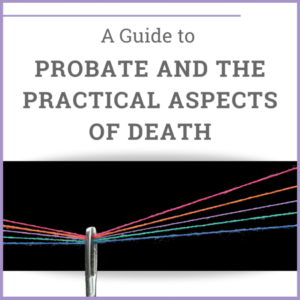A Power of Attorney is a legal document that allows another person to make decisions for you, or act on your behalf.
It can cover medical, financial and logistical decisions and it is therefore important that the person who acts as your Power of Attorney is trusted and informed. It is also important to note that relationship status, whether married or long-term partner, sibling, parent, best friend, no one will be able to look after your affairs without a Power of Attorney in place. A lengthy, and potentially expensive, court process would be required if you don’t have one and someone needs to represent your best interest. So this document is important.
Whether you are asking someone to be your POA or have been asked to be someone else’s, it is important to be sure the correct information is shared. This article will help outline what information and paperwork a Power of Attorney needs.
Paperwork
The first element of being a Power of Attorney is having the correct documentation in place. The next step is knowing where it is. To get an LPA you will want to speak with an experienced professional who is used to drafting and submitting these important documents. This does not have to be a solicitor, though using someone experienced and well-reviewed is recommended.
Once your LPA is written it will need to be submitted to Office of the Public Guardian. If your signed documents are not submitted, they will NOT be valid. To access your LPA after registration is complete, they will send you a certificate which includes the official stamp signifying your document is certified and legal. You are also able to access your LPA via the Office of Public Guardian, though this method is not fool proof so keeping the paper copy in a safe place is paramount. You should then ensure your Attorney and other relevant loved ones are aware of where the document is kept.
Understanding the Role and It's Responsibilities
Whether someone is looking after your health, finances or both, it is important that they have a thorough understanding of what this looks like. It is also important you understand what they have power over, as this might influence who you trust to take on the role.
An Attorney who is looking after your finances will have full access and control over bank accounts, investments, assets, property, possessions, etc. They will be able to pay bills, move money, manage pensions, sell property all on your behalf and without restriction.

If for any reasons, funds are no longer available to cover your costs, it is important to communicate to your attorney that they are NOT liable nor are they obligated to use their personal funds to make any payments. You, however, should be aware that if your attorny fails to make payments on your behalf when the funds are available, you will be liable for any fees or interest incurred. This is one of many reasons why it is important you choose someone you trust.
When it comes to Health & Welfare, your Attorney will be making all decisions in regard to your healthcare. This could include some serious elements like whether to prolong care, administer medication or undergo life altering procedures. Your attorney must be comfortable making decisions to this level and feel confident in their ability to do so.
Information to Share
Finance
Once you are confident in the person you would like to serve as your Power of Attorney, there are very important conversations you must have. Firstly, they need a clear list of your bank accounts, bills, investments, pensions, assets, etc. Any bills or payment that are reoccurring, like mortgage, internet, insurances, school lunch money, should be clearly communicated and maintained by your PoA. This can even include things like whether children receive an allowance.
Secondly, an indication of what out goings do not need to be maintained can be helpful. Are their subscriptions that can be cancelled or continued services that are not needed? It might end up being helpful to preserve funds in case the length of illness or injury is unknown. This might include selling of property to afford any long term care fees. It’s helpful for your PoA to know it this is something you would want done.
Ideally, once your PoA is in place, you will send a copy of it to any bank or financial institution you use so they can have it on record. This will expedite the process should your attorney need to act on your behalf in the future.
Your PoA should also keep very clear records of what they have been paying on your behalf. Receipts and invoices as well as any other financial transactions should be kept safe and organised. This way, if there are any discrepancies or concerns in the future, there is documentation to review.
Health & Welfare
The person acting as your PoA for Health & Welfare might literally make life and death decisions on your behalf. Therefore, it is of the utmost important that they have clear information about what your wishes are.

Things like if you’d want to be kept on life support, if any surgeries or procedures are recommended by doctors that comes with risks that would severely alter your quality of life; what would you want them to do? Will they be capable of advocating for your needs and wants?
This is not an easy role to ask someone to fill. The more you can do to help them understand what it is you want, the more you can relieve the burden from them to be making these decisions. Rather, they will just follow your wishes knowing the decisions have been made by you and that you are just their voice when they cannot have one.
As with a financial PoA, it is always a good idea to send a copy of your Health & Welfare PoA to your GP for their records. It will make it easier and faster for your attorney to step in if there is already a copy of the document in their files.
For both of these PoA, the most important thing is that they know what you would want. Whether in an emergency situation or through the regular course of business, how you want your life and affairs to be handled is how the PoA should act. So it is your responsibility to communicate, clarify and record exactly what that all is. It is their responsibility to follow your wishes.
For more information on the differences, please read our article Power of Attorney: Let’s Discuss the Different Types.
Where Things Are
In addition to the specific information about your wishes, you should let your PoA know where important documents are kept. This can be any, or all, of the following:
- The Power of Attorney documents
- Insurance policies
- Your will
- DNR or other medical paperwork
- List of accounts, assets, liabilities, etc
Not all of the above paperwork will necessarily be in their remit, but if you’ve chosen a PoA who is responsible and caring, they are a good person to keep informed about other documentation which might be needed at that point, or in the future.
Keeping People Informed
If there are other people in your life which you would like to have aware of your circumstances and situation, should your PoA need to act, this should be communicated. Whether it’s your place of work, your friends and family, social groups or other community responsibilities, ensuring those who need to know are informed will be part of your attorney’s responsibility.
There might also be people who you do not want to know things. Your attorney should be aware of who they are as well.

Conversation is Key Between Power of Attorney and Donor
Above all else, keep the dialogue open. Keep it honest and keep it true to who you are and what you want. The better your Attorney knows you, the more they understand your goals, values, wishes, the better they will be able to act on your behalf.
If you are the one acting as Power of Attorney, do not be afraid to ask questions. It will be impossible to cover ever potential scenario and for you/your Attorney to know the answer to every single question that might come up. If the Attorney has a real sense of who you are, they will be able to be more confident in their role.
It’s also worth noting that what you want may change over time. If this happens, then have another conversation and update any documents necessary. More clarity and communication will only help your attorney look after you to the best of their ability. And that is the goal here.
To meet with Luke from Bigmore Wills & Probate and discuss your LPA, please fill out the contact form below.

Here are a few more articles which might interest you:

 FREE GUIDE to Communicating an Employee Benefits Package
Previous post
FREE GUIDE to Communicating an Employee Benefits Package
Previous post




